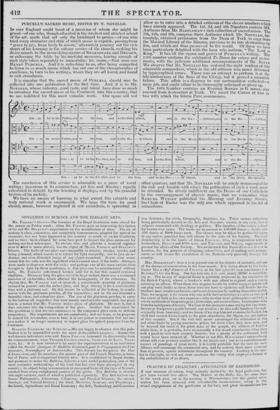PURCELL'S SACRED MUSIC, EDITED BY V. NOVELL°.
IF ever England could boast of a musician of whom she might be proud—of one who, though educated in the straitest and strictest school of the art, made that art only the handmaid to genius—of one who tried every character and style of which music is capable, passing from "grave to gay, from lively to severe," alternately pouring out the rich stores of his learning in the solemn service of the church, wedding his divine sounds to the never-dying strains of SHAKSPEARE and DRYDEN, or enlivening the table by his mirthful measures, leaving enough of each style taken separately to immortalize his name,—that man was IIE:sav PURCELL. And it is refreshing to us, after being compelled to listen to so much music which has not one of the characteristics of excellence, to turn to his writings, where they are all found, and found in rich abundance.
It is singular that the sacred music of PURCELL should now be collected into one publication for the first time. And it is to Mr. NovELno, whose industry, good taste, and talent have done so much to introduce the sacred music of the Continent into this country, that we are indebted for this most valuable work. Our space will not allow us to enter into a detailed criticism of the eleven numbers which have already appeared. The 1st, 3d, and 5th Numbers contain MS, Anthems from Mr. BARTLEMAN'S rich collection of sacred music. The 7th, 8th, and 9th, comprise three Anthems which Mr. NOVELL°, for- tunately, obtained permission from the Dean of York to copy from the Musical Library of the Minster, previous to its late destruction by fire, and which are thus preserved to the world. Of these we have been particularly delighted with the bass solo anthem, "The Lord is King." It has all the vigour and power of PURCELL'S writing. The. 11th number contains the celebrated Te Deum for voices and instru- ments, with the judicious additional accompaniments of Dr. BovcE We observe that Mr. NOVELLO has restored the right reading of this admirable composition, which in the old editions was much deformed by typographical errors. There was an attempt to perform it at the
i late anniversary of the Sons of the Clergy, but t proved a miserable failure. This affair is a disgrace to our metropolitan cathedral—a mere job, and ought either to be thoroughly reformed or given up. The 10th Number contains an Evening Service in G minor, also rescued from destruction at York. We insert the Canon of four in two with which the Gloria Patri commences.
The conclusion of this service is admirable as a piece of vocal writing; ingenious in its construction, yet free and flowing ; equally calculated to delight by the learning it displays, and by the graceful texture of its melody. We have no means of knowing to what extent this valuable and truly national work is encouraged. We hope the taste for good church, music, however neglected in our cathedrals, is spreading in
other quarters, and that Mr. NOVELL° will be amply remunerated for the risk and trouble with which the publication of such a work must be attended. So utterly indifferent are the Deans of our Cathedrals to the encouragement of church music, that we remember when SAMUEL WESLEY published his Morning and Evening- Service, the Choir of Exeter was the only one which appeared in his list of subscribers.


















 Previous page
Previous page